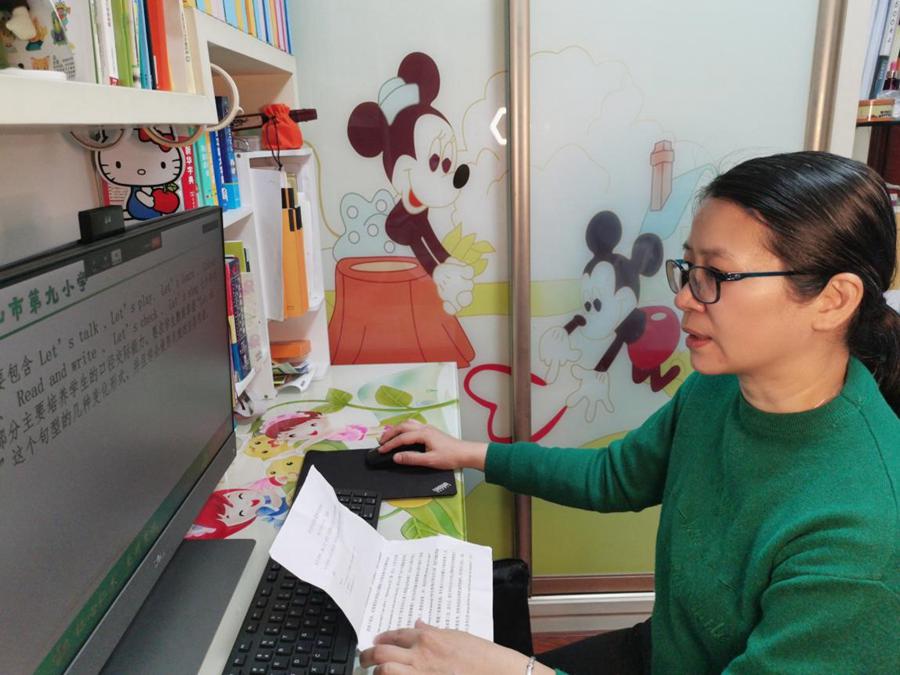South China's Guangdong province provides online training courses for teachers in Xinjiang
Payzawat county, Kashgar prefecture, northwest China's Xinjiang Uygur autonomous region, recently sent a silk banner to a primary school in Foshan, south China's Guangdong province, to express gratitude to the school for the online training it provided for teachers in the county.
During last winter holiday, several thousand teachers in Payzawat county took online training courses provided by an alliance made of 13 schools from nine cities in Guangdong, according to Yang Xiuhui, deputy director of the teacher training center in Payzawat county.
Located in the southern foothills of the Tianshan Mountains and the western margin of the Tarim Basin in southern Xinjiang, Payzawat county was in one of China’s contiguous poor areas.
With over 10,000 teachers and 160,000 students in 465 primary and middle schools and kindergartens, the county has huge demands for teacher training, Yang pointed out.
In response to the call of the central government, Guangdong province carried out a program that encourages teachers to give lessons in the schools of Xinjiang and southwest China's Tibet autonomous region in 2018.
Under the program, the province sent two teams of teachers to Kashgar prefecture, among whom 20 came to Payzawat county. They established 15 teacher training workshops in primary and middle schools, providing training covering courses like Chinese, math, geography, history, moral and physical education, music, calligraphy and painting, information science, and classics reading.
Guangdong has made active efforts to ensure that each school that it sent teachers to has at least one teacher training workshop, and that each teacher from the teaching teams dispatched by Guangdong to Payzawat county pairs up with at least one local teacher to provide professional guidance for the latter and participates in at least one activity designed to bring educational resources to rural schools, according to Chen Haotang, head of the teaching team sent by Guangdong to Payzawat county as well as vice principal of a high school in the county.
So far, 170 teachers from Guangdong have paired up with a total of 307 teachers from five schools in Payzawat county.
Teachers from 13 schools in nine prefecture-level cities in Guangdong, including Foshan, Shantou, Heyuan, Huizhou, Shanwei, Zhongshan, Zhanjiang, Zhaoqing, and Yunfu, have actively joined the program since it was launched.
On Dec. 28, 2020, the 13 schools formed the alliance to train teachers in Payzawat county.
In last winter holiday, the alliance rolled out online training courses via live streaming, which were expected to have 3,000 participants but attended by about 5,000 teachers from all primary and high schools in Payzawat county.
The live-streaming courses were arranged for the time period between 9 p.m. and 10 p.m. for the convenience of teachers in Payzawat county. To guarantee the quality of the online courses, relevant teachers in Guangdong all stayed in their schools after school to give lessons using school facilities.
The key to helping Xinjiang with education and providing online training courses is to share teaching and education research experience, as pointed out by Luo Qiuxia, principal of a primary school in Foshan, who conducted investigations in Payzawat county and gave lessons there in 2019.
As the beneficiaries of the training were mostly young teachers who just started to work, the way of teaching is just as important as what to teach during the courses, according to Wei Lirong, a teacher in Chinese from Guangdong.
"All the members of our Chinese teaching and research group made up of teachers sent to aid schools in Xinjiang discuss together how to evaluate the teaching quality of Chinese courses," Wei added.
"We really appreciate the opportunity to learn from experienced teachers in Guangdong and have benefited a lot from their targeted and practical courses," said Bao Jinlong, a teacher from Payzawat county who took part in the training courses.
Launching one training activity and donating a batch of books and stationery are not enough for assisting Xinjiang with its education, said Chen, who considers long-lasting efforts necessary.
"By rolling out online courses and sharing education research experience, we intend to build a standing volunteer teaching team for Xinjing and equip local teachers with our teaching concepts and methods via an education assistance mechanism," Chen said.
 |
Photos
Related Stories
- Nang Cultural Industrial Park opens to public after renovation
- Traditional crafts with Xinjiang characteristics exhibited in Urumqi
- Xinjiang's electricity transmission volume up 42 pct in Q1
- Blooming apricot flowers draw tourists to Xinjiang
- In pics: Xinjiang Wild Horse Breeding and Research Center
- US media: Allegation of "genocide" in Xinjiang unjustified
- Rescue workers strive to save trapped miners in Xinjiang
- British MPs should mind their own business: FM spokesperson
- Chinese embassy condemns British motion related to Xinjiang
- Muslims in Xinjiang observe Ramadan
Copyright © 2021 People's Daily Online. All Rights Reserved.











